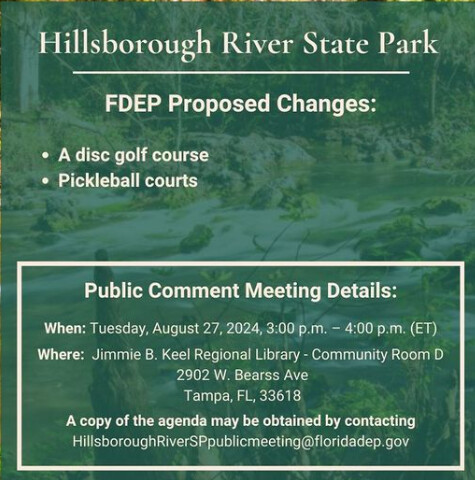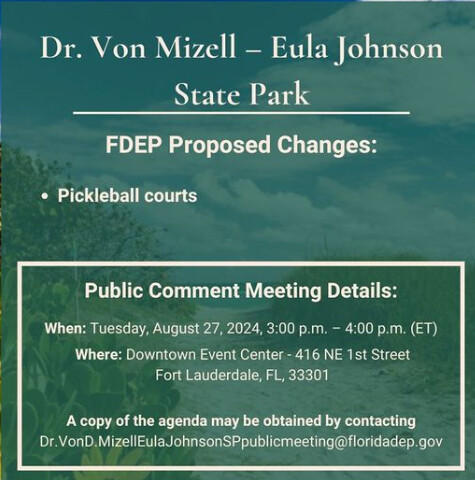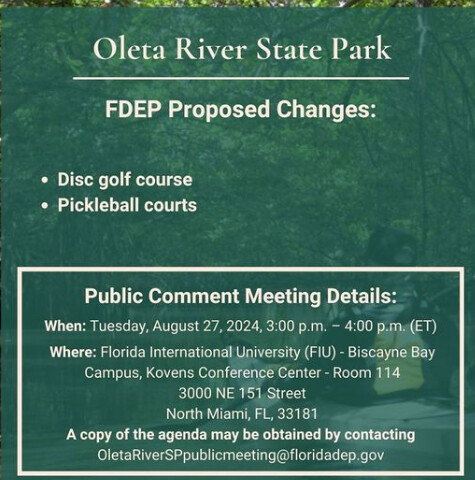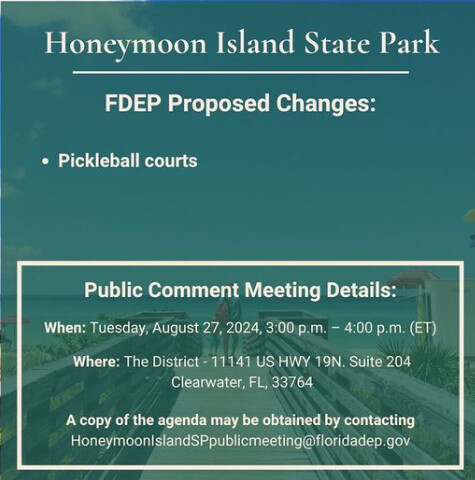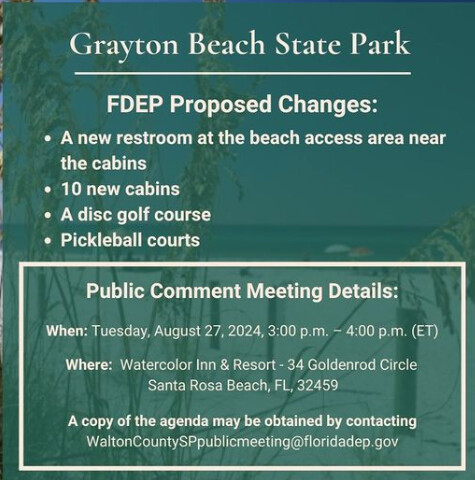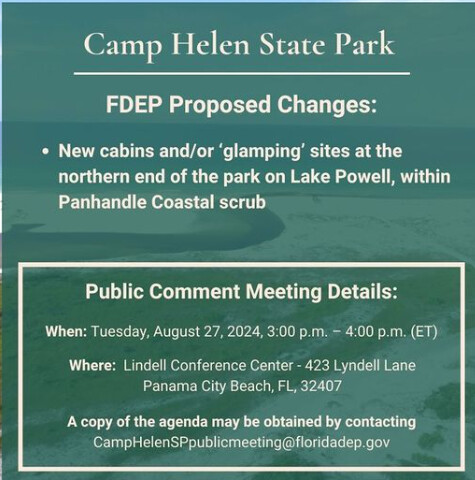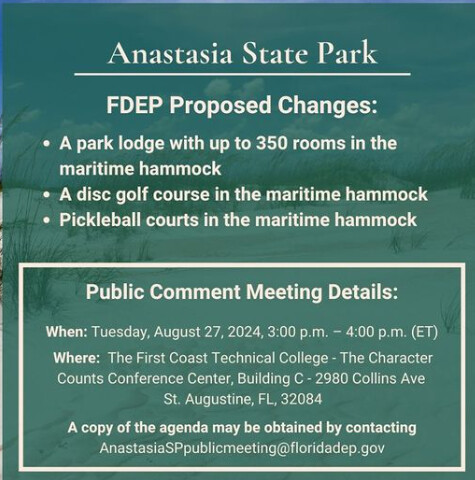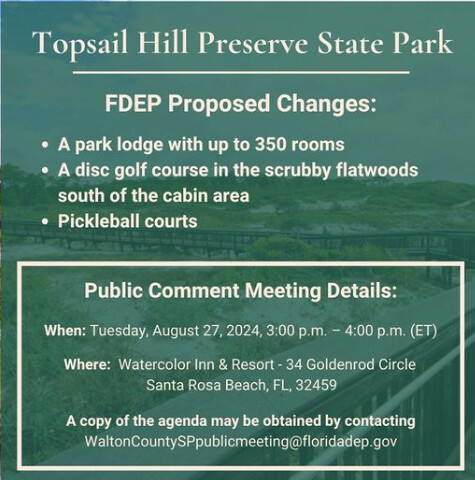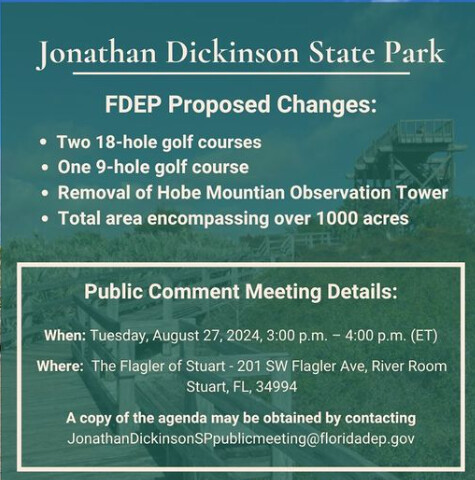Image
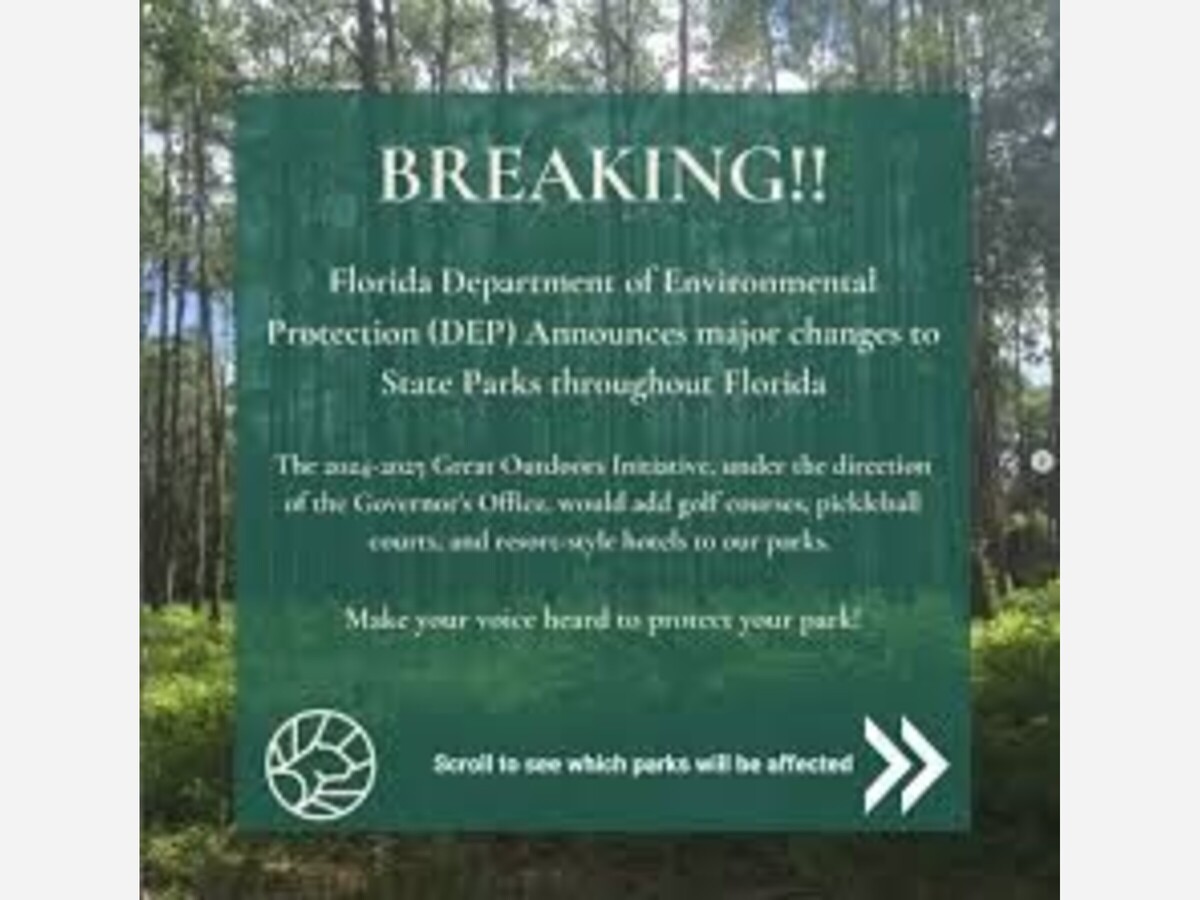
Recent developments in Florida's state parks have sparked concern among residents, environmentalists, and conservation groups alike. The Florida Department of Environmental Protection (FDEP) has unveiled the 2024-2025 "Great Outdoors Initiative," a plan that promises to increase outdoor recreation but comes at a high environmental cost. This initiative includes adding resort-style lodges, golf courses, pickleball courts, and other recreational amenities to several state parks across the state, raising alarms about the future of Florida’s natural landscapes.
While the FDEP argues that these changes will enhance public access and boost the state's outdoor recreation economy, many fear that these developments threaten the very ecosystems these parks were established to protect. Anastasia State Park, for example, a critical habitat for the endangered Anastasia Island beach mouse, is slated for the construction of a 350-room lodge, a golf course, and pickleball courts(FL PoliticsAction News Jax). These changes risk destroying sensitive habitats, contributing to species extinction, and undermining conservation efforts that have taken decades to build.
The proposed developments are not limited to Anastasia State Park. Other parks, including Jonathan Dickinson, Camp Helen, Honeymoon Island, and Dr. Von D. Mizell-Eula Johnson, will also face significant changes if this initiative moves forward (FL Politics). Many of these parks serve as refuges for wildlife, offering Floridians a chance to experience nature in its purest form. The commercialization of these spaces under the guise of “outdoor recreation” threatens to degrade the natural beauty and ecological significance that makes Florida’s state parks unique.
SCROLL TO THE BOTTOM OF THE ARTICLE AND CHECK THE IMAGE GALLERY TO SEE THE PROPOSED CHANGES TO YOUR LOCAL STATE PARK.
Florida's state parks attracted nearly 30 million visitors in the 2022-2023 fiscal year, contributing $3.6 billion to the state economy and supporting over 50,000 jobs(Action News Jax). However, these parks are not just economic assets—they are irreplaceable environmental treasures. Expanding recreational amenities may seem like a way to draw even more visitors, but at what cost? The destruction of habitats, the displacement of wildlife, and the eventual commercialization of these parks could leave future generations with little more than remnants of Florida’s once-thriving natural landscapes.
For those who cherish the tranquility and beauty of Florida’s parks, now is the time to take action. The FDEP has scheduled a series of public meetings on August 27, where concerned citizens will have the opportunity to voice their objections. These meetings are vital because once they conclude, only 48 hours remain for additional public comments to be submitted. After that, the window for meaningful public input will close(FL Politics).
Attend the Public Meetings on AUGUST 27th at 3PM: Your presence matters. These meetings offer a brief three-minute opportunity for each person to speak. Make your voice heard by attending the one closest to you:
Submit Your Comments: If you cannot attend, make sure to submit your written comments to the appropriate contact for each park. Your feedback within the 48-hour window after the meetings is crucial.
Spread the Word: Inform friends, family, and neighbors about these changes. Many Floridians are unaware of the potential damage to their beloved parks. The more people involved, the louder our collective voice will be. Share this article on all social media channels and email a link to the article to your friends, family, and community members.
The push to commercialize Florida's state parks is not just about building more recreational facilities. It reflects a broader trend of prioritizing short-term economic gain over long-term environmental sustainability. Florida is already home to over 1,100 golf courses and is the leading state for pickleball locations(Action News Jax). Do we need more of these facilities at the expense of our natural treasures?
Environmental protection must remain the priority when it comes to managing public lands. The expansion of commercial amenities will only detract from the conservation mission that these parks were originally founded upon. Once natural habitats are lost, they cannot be easily restored. The time to act is now—before irreversible damage is done.
Let us protect Florida’s natural heritage for the enjoyment of future generations.
More information (extended look at the issue)
The "Great Outdoors Initiative" in Florida is being pushed primarily by the Florida Department of Environmental Protection (FDEP), along with support from certain lawmakers and private interests. This initiative is part of a broader effort to increase public access to state parks and boost outdoor recreation tourism. Here’s a deeper look into the driving forces behind it:
The FDEP, tasked with overseeing Florida’s natural resources, argues that the "Great Outdoors Initiative" is designed to modernize state parks by adding recreational facilities like lodges, golf courses, and sports courts. They claim that these changes will help accommodate the growing demand for outdoor recreation and boost the state’s economy by attracting tourists and creating jobs in park-adjacent communities.
Florida's state parks have long been an economic engine, contributing billions of dollars to the state’s economy and providing jobs. The FDEP is leveraging this economic argument to push for expanding facilities, framing the changes as necessary for the state’s continued growth and as part of their broader mandate to manage natural resources in a way that benefits the public.
The tourism industry, particularly resort developers and outdoor recreation companies, stands to benefit significantly from the commercialization of Florida’s parks. Florida is a top destination for both domestic and international tourists, and these businesses see an opportunity to capitalize on the influx of visitors by expanding infrastructure within state parks. By building more accommodations, golf courses, and sports facilities, they hope to turn parks into more attractive, multi-day destinations.
In addition, as interest in outdoor activities such as hiking, camping, and sports like pickleball grows, private recreation companies are eyeing state parks as prime real estate for new developments. For example, golf course and pickleball court developers are likely lobbying for space within these parks to cater to tourists and Floridians alike.
Behind this initiative are also political figures who receive significant campaign contributions from private interests and developers. These politicians are likely framing the expansion as a job-creation and revenue-boosting measure, which appeals to local businesses and voters. However, in many cases, these politicians are beholden to corporate donors who have a vested interest in seeing state parks developed for commercial use.
By supporting this initiative, these politicians can deliver economic benefits to their constituents in the form of tourism dollars and jobs, while at the same time rewarding corporate backers who will profit from the development of state park lands.
Real estate developers are another powerful group behind the push for the commercialization of state parks. With the state’s population booming and tourism increasing, developers see opportunities to build high-end resorts and commercial infrastructure within parks that would cater to wealthier visitors. These developments are often pitched as beneficial to local economies, but in reality, they often end up pricing out everyday Floridians and destroying the very natural environments that people come to enjoy.
The key motivators behind this initiative are economic gain and political power. Here are the main reasons driving the push:
While the initiative is framed as beneficial to the public, the reality is that it risks irreversible damage to Florida’s natural heritage. The expansion of resorts, lodges, and recreational amenities could degrade delicate ecosystems, displace wildlife, and transform parks into overcrowded tourist destinations, losing the serenity and natural beauty they are meant to protect. Many critics argue that this is less about "public access" and more about commercial exploitation of public lands for private profit.
In conclusion, the push behind the "Great Outdoors Initiative" comes from a blend of state government officials, private developers, and corporate interests, all seeking to profit from the commercialization of Florida’s state parks. For those of us who value freedom, personal responsibility, and the preservation of Florida’s natural wonders, this is a fight we can’t afford to ignore.
(c) Tidings Media, 2024. All rights reserved. Reprints are OK with credit to www.tidings.town.news
